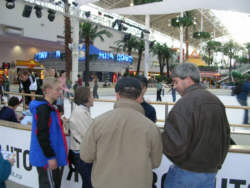 After returning from
Ognikovo, a few of the missionaries who were waiting for flights took us to one of the
local Moscow "Molls." As you can see, it's not much different than what you'd
see here in a nice mall. Russians have plenty of stores and shopping available to them
now, but most Russians can't afford to shop at anything other than the discount stores. After returning from
Ognikovo, a few of the missionaries who were waiting for flights took us to one of the
local Moscow "Molls." As you can see, it's not much different than what you'd
see here in a nice mall. Russians have plenty of stores and shopping available to them
now, but most Russians can't afford to shop at anything other than the discount stores.
|
 While in Moscow, we stayed in this high-rise apartment
complex. There are thousands and thousands of buildings just like this one in Moscow. You
don't see houses, just high-rises. While in Moscow, we stayed in this high-rise apartment
complex. There are thousands and thousands of buildings just like this one in Moscow. You
don't see houses, just high-rises. |
 Except for the czarist-era
architecture in Red Square, Moscow is very much blocks of concrete and glass left over
from the Soviet era. The notable exceptions are the seven "wedding cake"
buildings around the city. These were commissioned by Joseph Stalin shortly after the
Empire State Building was erected to show that the Soviet Union was capable of stately
modern architecture as well. Of course, Stalin's buildings were only 40-something stories. Except for the czarist-era
architecture in Red Square, Moscow is very much blocks of concrete and glass left over
from the Soviet era. The notable exceptions are the seven "wedding cake"
buildings around the city. These were commissioned by Joseph Stalin shortly after the
Empire State Building was erected to show that the Soviet Union was capable of stately
modern architecture as well. Of course, Stalin's buildings were only 40-something stories.
|
 On November 3rd, we took the very efficient metro (subway) system to Red
Square. Unlike the rest of Moscow, the architecture here is ornate and beautiful, the
legacy of the czars. This museum is on the North end of Red Square. I'm standing in front
of Marshall Zhukov, a war hero of the Soviet Union. On November 3rd, we took the very efficient metro (subway) system to Red
Square. Unlike the rest of Moscow, the architecture here is ornate and beautiful, the
legacy of the czars. This museum is on the North end of Red Square. I'm standing in front
of Marshall Zhukov, a war hero of the Soviet Union. |
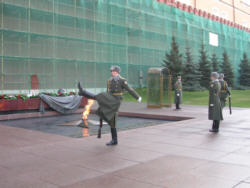 Red Square was
actually closed when we got there because they were having a viewing of Lenin's tomb. We
took this opportunity to visit the "eternal flame" outside the Kremlin where we
saw the changing of the guard. The eternal flame is a memorial in honor of WWII, the
"Great Patriotic War," where the Soviets lost millions of men fighting the
Germans. Red Square was
actually closed when we got there because they were having a viewing of Lenin's tomb. We
took this opportunity to visit the "eternal flame" outside the Kremlin where we
saw the changing of the guard. The eternal flame is a memorial in honor of WWII, the
"Great Patriotic War," where the Soviets lost millions of men fighting the
Germans.
|
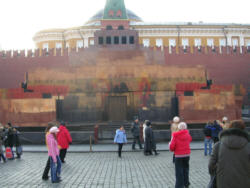 We did get to see Lenin, but you can't take any pictures. His
tomb is a strange-looking polished marble structure backed by the Kremlin. Despite the
fall of Communism, this is still a hallowed place for Russians, not even quiet whispers
are allowed in the tomb. If you ask me, he looked awful waxy. . . We did get to see Lenin, but you can't take any pictures. His
tomb is a strange-looking polished marble structure backed by the Kremlin. Despite the
fall of Communism, this is still a hallowed place for Russians, not even quiet whispers
are allowed in the tomb. If you ask me, he looked awful waxy. . . |
 The east side
of Red Square is framed by the GUM (an acronym pronounced "goom"). Despite its
palace-like appearance, it's actually a giant shopping mall, the first shopping mall in
Russia. I was a little freaked-out when I first saw the red banners, red stars and
hammer-and-sickles. I only THOUGHT Communism was dead. In fact, it's still the number two
of four major political parties and gets about 20% of the vote in elections, mostly the
elderly who feel they had it better under Communism. I later found out the decorations
were for a re-enactment of a WWII parade being held a few days later. The east side
of Red Square is framed by the GUM (an acronym pronounced "goom"). Despite its
palace-like appearance, it's actually a giant shopping mall, the first shopping mall in
Russia. I was a little freaked-out when I first saw the red banners, red stars and
hammer-and-sickles. I only THOUGHT Communism was dead. In fact, it's still the number two
of four major political parties and gets about 20% of the vote in elections, mostly the
elderly who feel they had it better under Communism. I later found out the decorations
were for a re-enactment of a WWII parade being held a few days later.
|
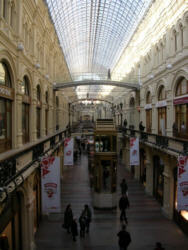 This is inside the GUM. There are three stories of shops and three
hallways just like this one. All of the stores are very exclusive and expensive. During
Soviet times, the GUM was open only to diplomats and high-ranking members of the Communist
Party. So much for Marx's "everyone's equal" philosophy. This is inside the GUM. There are three stories of shops and three
hallways just like this one. All of the stores are very exclusive and expensive. During
Soviet times, the GUM was open only to diplomats and high-ranking members of the Communist
Party. So much for Marx's "everyone's equal" philosophy. |
 Crusing around
Red Square is amazing. The architecture is stunning! This is the state museum in the
foreground and the Kremlin in back. Crusing around
Red Square is amazing. The architecture is stunning! This is the state museum in the
foreground and the Kremlin in back.
|
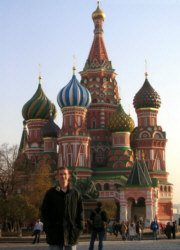 Of course,
no trip to Moscow is complete without St. Basil's cathederal. This is at the south end of
the square, and it's just as beautiful as it looks. It was completed in the 1550s and has
been meticulously maintained and restored over the years. Of course,
no trip to Moscow is complete without St. Basil's cathederal. This is at the south end of
the square, and it's just as beautiful as it looks. It was completed in the 1550s and has
been meticulously maintained and restored over the years. |
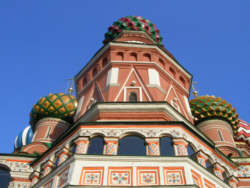 The cathederal's colors were
very vivid and beautiful in the sun. Our timing was pretty good, too. Steve, the
missionary acting as our tour guide, said this was the first time he's ever seen St.
Basil's without scaffolding on it in the years he's been there. The cathederal's colors were
very vivid and beautiful in the sun. Our timing was pretty good, too. Steve, the
missionary acting as our tour guide, said this was the first time he's ever seen St.
Basil's without scaffolding on it in the years he's been there.
|
 The Kremlin was closed to visitors the first day, so we went
down the river to see Christ the Savior Church, the "Vatican" of the Russian
Orthodox Church. While it looks old, it was only built within the last decade. In 1931,
Stalin ordered the original church to be torn down and its basement turned into a swimming
pool. After 70 years, the church has had the last laugh. The Kremlin was closed to visitors the first day, so we went
down the river to see Christ the Savior Church, the "Vatican" of the Russian
Orthodox Church. While it looks old, it was only built within the last decade. In 1931,
Stalin ordered the original church to be torn down and its basement turned into a swimming
pool. After 70 years, the church has had the last laugh. Like many places, we couldn't
take pictures inside, but every inch of the walls and ceilings was painted in stunning
murals depicting the life of Christ and Old Testament stories. Interestingly, like all
Russian Orthodox churches, there were no seats inside. Rumor has it Easter services may
last as long as 14 hours. . . |
 Across the
Moscow river was a giant monument to Peter the Great. This is ironic because Czar Peter
actually moved the capitol of Russia from Moscow to St. Petersburg where it stayed until
the Communists moved it back to Moscow after the Revolution. Across the
Moscow river was a giant monument to Peter the Great. This is ironic because Czar Peter
actually moved the capitol of Russia from Moscow to St. Petersburg where it stayed until
the Communists moved it back to Moscow after the Revolution.
|
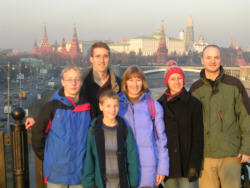 Our group was having a great time taking in all the sights.
Doug and Beth weren't with us because they went with some of the missionaries to St.
Petersburg to see a different part of the Russian field. The Kremlin is in the background. Our group was having a great time taking in all the sights.
Doug and Beth weren't with us because they went with some of the missionaries to St.
Petersburg to see a different part of the Russian field. The Kremlin is in the background. |
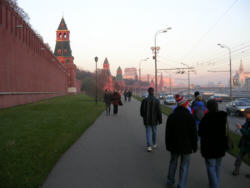 Red Square is supposed to be
magnificent after dark, so we walked the mile back on a nice path between the Kremlin and
the river. Red Square is supposed to be
magnificent after dark, so we walked the mile back on a nice path between the Kremlin and
the river.
|
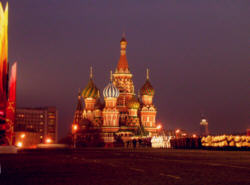 Red Square
didn't disappoint! The square was closed so the soldiers could practice for the upcoming
parade, but we found a spot to view the action. You can see the soldiers marching in
different WWII replica uniforms. This was to be the first military parade in the sqare
since the fall of the Soviet Union. Red Square
didn't disappoint! The square was closed so the soldiers could practice for the upcoming
parade, but we found a spot to view the action. You can see the soldiers marching in
different WWII replica uniforms. This was to be the first military parade in the sqare
since the fall of the Soviet Union. |
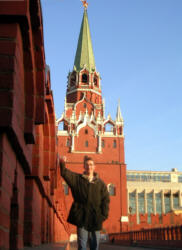 On our last day in Russia, we went to a large open-air
market. The vendors had all the classic Russian stuff, stacking dolls, fur hats, military
stuff, you name it, and every price was negotiable. It was a lot of fun, and I wish I had
pictures! On our last day in Russia, we went to a large open-air
market. The vendors had all the classic Russian stuff, stacking dolls, fur hats, military
stuff, you name it, and every price was negotiable. It was a lot of fun, and I wish I had
pictures!
We went back to the Kremlin, and this time we were allowed in, but only
after paying 2000 Rubles for a Russian guide (no unescorted foreigners since it was a
Russian holiday). Kremlin is Russian for "fortress." This Kremlin was first
constructed in the 1100s with most of the current wall built in the 1600s. |
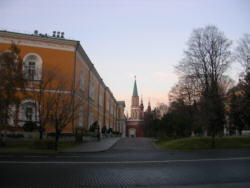 Inside,
there are many government buildings, churches, museums and theaters. The yellow building
is "the armory," a museum we couldn't get into, and the building on the right
hidden by trees is President Putin's residence. Inside,
there are many government buildings, churches, museums and theaters. The yellow building
is "the armory," a museum we couldn't get into, and the building on the right
hidden by trees is President Putin's residence. |
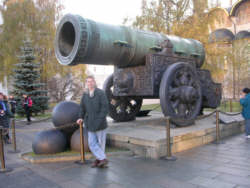 For
centuries, this was the world's largest cannon; it's never been fired. . . For
centuries, this was the world's largest cannon; it's never been fired. . .
|
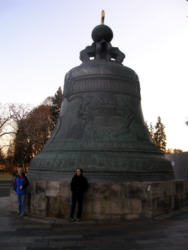 This is the world's largest bell; it's never been rung. (It's
a good thing, too, because modern acoustic experts say its frequency would not be heard,
but it would burst blood vessels in the brain causing death). This is the world's largest bell; it's never been rung. (It's
a good thing, too, because modern acoustic experts say its frequency would not be heard,
but it would burst blood vessels in the brain causing death). |
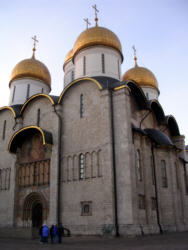 We also visited the church where all the Czars were coronated
until the move to St. Petersburg. It was completed 13 years BEFORE Columbus sailed to
America. Like much of Europe and Asia, things in Russia are just older, and their
perspective is different. For example, Russian law prohibits the export of
"antiques" from the country. One of our team bought an old samovar, a
self-heating water pot, from the market. It was made in the 1800s, and the vendor wrote a
note for customs stating that the item was only 100 years old, so it was clearly not in
violation of the antique rule! We also visited the church where all the Czars were coronated
until the move to St. Petersburg. It was completed 13 years BEFORE Columbus sailed to
America. Like much of Europe and Asia, things in Russia are just older, and their
perspective is different. For example, Russian law prohibits the export of
"antiques" from the country. One of our team bought an old samovar, a
self-heating water pot, from the market. It was made in the 1800s, and the vendor wrote a
note for customs stating that the item was only 100 years old, so it was clearly not in
violation of the antique rule!
|
 The next day, November 5th, we left Russia and returned to
Colorado. This was a wonderful trip! Thank you to everyone who supported me both
finacially and in prayer--God truly proved himself ever-faithful. I sincerely hope He
allows me to return again to serve these amazing families. The next day, November 5th, we left Russia and returned to
Colorado. This was a wonderful trip! Thank you to everyone who supported me both
finacially and in prayer--God truly proved himself ever-faithful. I sincerely hope He
allows me to return again to serve these amazing families.-Dan
(Christ the Savior Church and the Moscow River at sunset) |
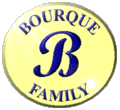
![]()